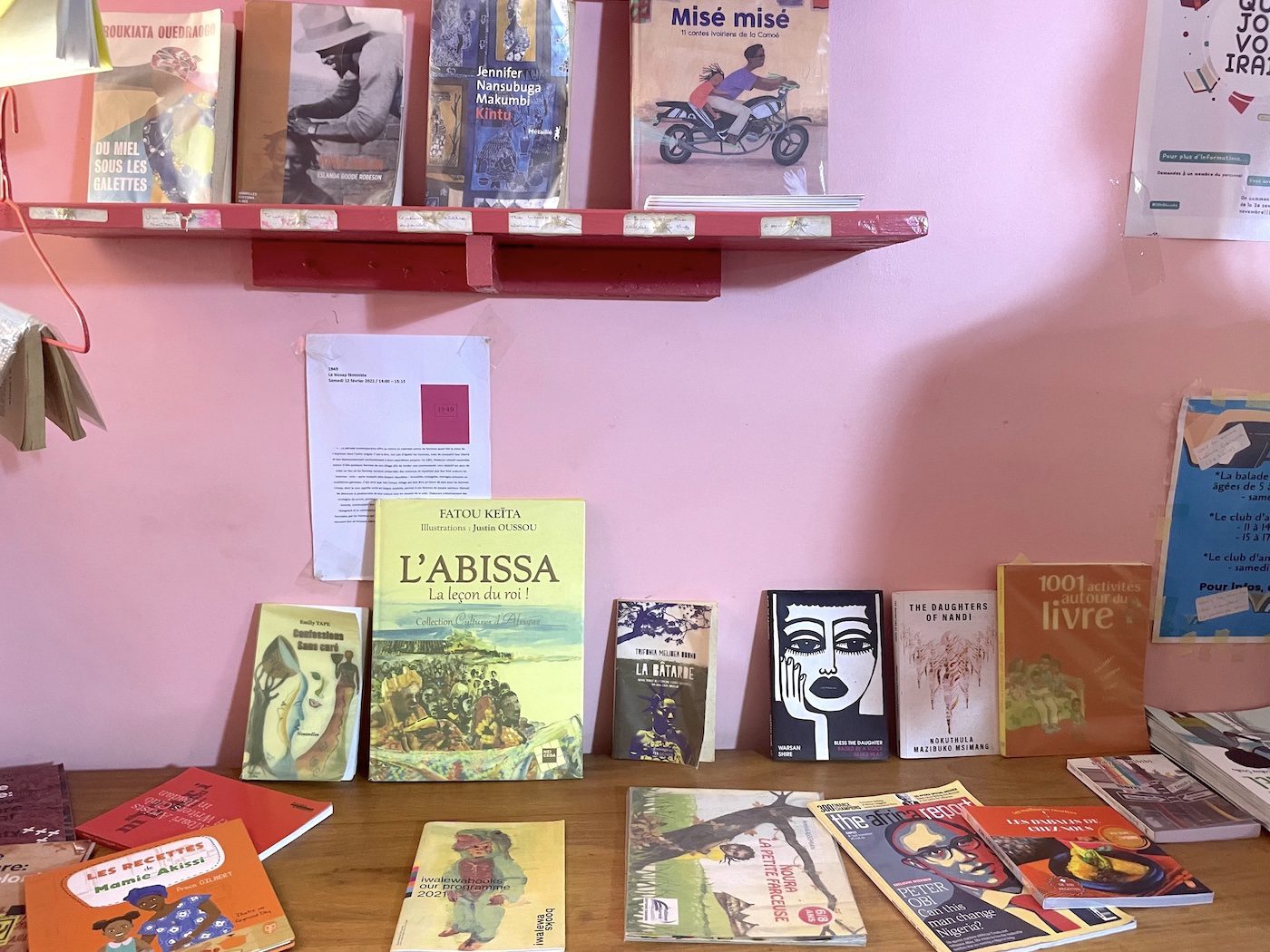Take a look into libraries and book collections holding certain rarer and often forgotten publications which are nonetheless essential to the discourse. This time, Keren Lasme introduces five books from 1949, Abidjan’s only library of women writers.

1949 Library. Photo: Keren Lasme.
A faint scent of freshly burnt incense welcomes me at the door of 1949. I am about to spend the afternoon with Edwige Dro, writer, literary activist, and founder of Abidjan’s only library of women writers from Africa and the Black world. In the main reading room, youngsters sit at a table flipping through laminated books. Upstairs the walls are covered with drawings, ephemera, and posters – while books, interestingly enough, are suspended on hangers. They are a sample of the hundreds of books from Dro’s private collection that were used to build the library’s initial holdings. 1949 was launched in 2020, but it had existed in the mind of the founder since 2016.
The library was a response to the general discourse around Dro that considered the life of African women as afflicted by suffering, self-abnegation, hardship, and subjugation. Being a voracious reader, Edwige Dro knew that in women’s literature there were multitudes of worlds, voices, narratives, and concerns encompassing our collective human experience, and that she could share these with her community. 1949 turned a family compound into a bilingual feminist library in the heart of Yop City, Abidjan’s most populous neighborhood.
This name 1949 is a nod to the Women’s march on Grand-Bassam, a significant moment in the history of the Côte d’Ivoire anti-colonial movement. In 1949, more than 2000 women, of whom many were politicians, walked from Abidjan to Grand-Bassam to obtain the freedom of politician Marcelline Sibo, who was accused of unlawful protest and being a public nuisance. Viewed as the first mass protest by West African women against French colonial rule, the march eventually led to the release of other members of the Ivorian government unjustly imprisoned in Bassam.
The following selection of books is an attempt to highlight women artists, writers, activists, and freedom fighters who contributed in their own way to the liberation of minds, bodies, and spirits.
L’Éternelle Reine: 50 ans de Peintures & de Poésies by Werewere-Liking (2021)
For the longest time Werewere-Liking, la reine-mère (the queen mother) as she is often referred to, inhabited my young girl’s imagination with her regal dresses and powerful presence. A multidimensional and multidisciplinary Cameroonian artist and Bassa initiate, she was at the forefront of the art scene in Côte d’Ivoire in the 1980s. She created the Ki-Yi Mbock theater troop and founded the Ki-Yi village, a cultural and learning center championing the performing arts. This wonderful and visually stimulating book celebrates fifty years of Werewere-Liking’s career. A deep dive into the multiplicity of her visual works and poetry, all deeply rooted in African oral and spiritual traditions.
Wake: L’Histoire cachée des femmes meneuses de révoltes d’esclaves by Rebecca Hall and Hugo Martinez (2022)
Aesthetically pleasing black-and-white comics with a nice paper feel, Wake brings to light the hidden stories of Black women who actively participated in slave revolts during the Middle Passage and in the Americas in the eighteenth century. The book distills Rebecca Hall’s extensive archival research on the subject, intertwined with her own personal experience as the granddaughter of slaves. Old court files, captains’ logbooks, and correspondence were the primary sources that helped the author retrieve the lives of these freedom fighters, risk-takers, and tribe leaders who longed to be known and acknowledged. The powerful and haunting illustrations give life to faces forgotten for too long.
Male Daughters, Female Husbands: Gender and Sex in an African Society by Ifi Amadiume (1987)
Outstanding, bold, and compelling, this book is the first of its kind. It is a groundbreaking work in the study of gender in Africa, an essential read for anyone interested in deepening their understanding of gender and sex issues, especially within the context of pre-colonial societies. The author examines structures in African societies that enable people to achieve power beyond socially constructed and imposed gender roles. As Uganda recently passed some of the harshest anti-LGBTQ legislation in the world, it is vital that Ifi Amadiume’s work be made accessible for research and engagement so that the teachings and knowledge he presents are integrated into our collective imagination.
Strong: Three Poems by Pat Parker (2015)
A small collection featuring three poems by lesbian feminist poet and activist Pat Parker. A gripping poetic journey that disrupts and brings salvation all at once. It recounts with huge vulnerability and rawness the poet’s experience as a Black lesbian feminist living in the United States:
of the four
daughters of Buster Cooks,
children, survivors
of Texas-Hell, survivors
of soul-searing poverty,
survivors of small-town
mentality
Les femmes dans la littérature africaine: Portraits by Denise Brahimi and Anne Trevarthen (1998)
This rare book is a treasure to those interested in women’s writings, African literatures, and comparative literature. It is an insightful essay which critically looks at African female characters in novels from the colonial to the postcolonial era written by both women and men. The book reveals recurring images of women from the romanticized mother figure to the strong African woman or weak African woman. It is also a great literary source that makes reference to various women writers, including Mariama Bâ, Calixthe Beyala, and Aminata Sow Fall, who paved the way for contemporary African literatures.
INSIDE THE LIBRARY
More Editorial